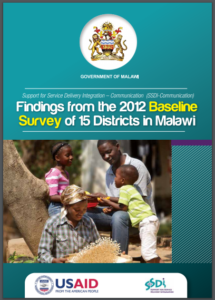Formative Research
Formative Research
Formative research is essential to effective strategy design in any SBCC project. However, integrated SBCC programs must take into account additional nuances and considerations. Before designing your integrated SBCC strategy, you need to conduct some level of formative research to better understand your audiences and the health topics and behaviors you plan to address. Your findings from this research will be used to inform the development of your strategy.
In general, formative research should uncover what people currently know, think, feel and do about the relevant topics and behaviors, and to understand their motivations and barriers to changing or adopting new behaviors. In integrated SBCC programs, the formative research should also help determine whether and how different topics and behaviors relate to one another. Both types of information will help the program and partners determine what to include in an integrated SBCC strategy, and provide insight on how best to do it. Engage a wide representation of stakeholders at all levels (e.g., communities, leaders and other stakeholders) when identifying which issues to address.
Tip
Some influential stakeholders might want to exert influence that conflicts with what community stakeholders want or need, or what the research says should be done, such as targeting inappropriate audiences or prioritizing irrelevant health topics. Continuously reinforce the need for the SBCC effort to go where the formative research directs might help.
Formative Research Methodologies may include more traditional approaches, such as focus group discussions (FGDs) or in-depth interviews (IDIs). Less traditional, user-centered ethnographic techniques include direct observation, immersion, mystery client experiences, interactions with spaces, customer journey mapping, photo diaries, photo elicitation and card sorts. These less conventional methodologies can help provide more well-rounded perspectives of the target audience’s understanding and experience with your topic areas, and yield unexpected, actionable insights. For more information on how to conduct formative research, review the Resources on at the end of this section, including How to Conduct Qualitative Formative Research, the Total Market Approach, Trials of Improved Practices and human-centered design research techniques.
In integrated SBCC programming, it is especially important to seek sources of information beyond your beneficiaries to inform your programming. Interview topical, behavioral and/or integration experts, for example, to gather important lessons learned and to gain new perspectives on your topics and how they might be linked. Conduct literature reviews on similar integrated interventions that have been implemented elsewhere for important guidance on program design, including both peer-reviewed articles and gray literature. The stakeholder and environmental analyses in Laying the Foundation are also types of formative research meant to inform program design and implementation.
Program Experience
Formative Research Methodologies
(When you see a Program Experience, simply click on the photo to read insights from real integrated SBCC programs.)


